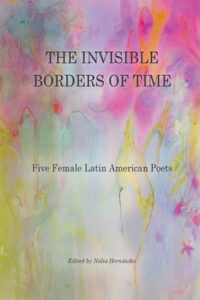Medford, Massachusetts: Arrowsmith Press. 2022. 174 pages.
 The Invisible Borders of Time is a bilingual compilation of poems by five highly regarded female Latin American poets: Cristina Peri Rossi (Uruguay), Piedad Bonnett (Colombia), Yolanda Pantin (Venezuela), Carmen Boullosa (Mexico), and Rossella Di Paolo (Peru).
The Invisible Borders of Time is a bilingual compilation of poems by five highly regarded female Latin American poets: Cristina Peri Rossi (Uruguay), Piedad Bonnett (Colombia), Yolanda Pantin (Venezuela), Carmen Boullosa (Mexico), and Rossella Di Paolo (Peru).
Cristina Peri Rossi is known for her erotic poetics that explore not only the physicality of love but also music and blues that blend the idealization of the body with an exploration of perfect love with its attendant longing and loss. “Blanca” / “White” is an homage to the female body where the language of poetics is used as a construct of the body’s secret pleasures. “Deseo” / “Desire” weaves together the blues of Tom Waits with the city’s labyrinths and the elusive presence of women once loved and longed for.
Piedad Bonnett’s background in philosophy is evident in her phenomenological approach to poetics, where she constructs paradoxical juxtapositions with similes that make the ordinary fresh and new: in “Del Reino de Este Mundo” / “The Kingdom of This World,” “breasts are firm and sweet like a pair of windows full of light.” Her poems are wryly humorous: in “Miserable Men Make Terrible Dance Partners,” “no woman can be more / lonely, more miserably lonely, than she / who wishes to love a miserable man” (see World Literature Today, Jan. 2022, 15).
Yolanda Pantin alternates between dense tone poems of prose and an open minimalism to create a contemplative canvas. Nowhere is this more apparent than in “Notes for a Poetics (Version II, against myself).” References to paintings, filmmakers (Tarkovsky), and writers construct a frame for introspective passages flowing from juxtapositions: her sister, secrets, outrageous ambition, the island of Margarita.
Oblivion and the indeterminate give Carmen Boullosa’s poetry a haunting quality, even as her metaphors are tactile and immediate. She describes night as a “strange petal that falls like winged rust” in one poem, and then in another, night is a “peaceful skein of sound.” In both “Memoria Vacía” / “Empty Memory” and “El Hilo Olvida” / “The Thread Forgets,” the world becomes a mosaic textured with the people, sounds, and landscape of everyday life, where the narrator sees herself as raging yet mute, communication thwarted as those around her sleep.
Rossella Di Paolo’s spare poems contain powerful personification and imagistic lines that evoke emotions of longing and aspiration. In “Las Montañas” / “The Mountains,” the mountains experience nostalgia, resignation, and have wings that allow future flight. In “Milquinientas” / “Fifteen Hundred,” the narrator perceives herself as a stone goat in the mountains, always climbing, always dreaming, despite the “thorny sun that scratches my eyes.”
The goal of editor Nidia Hernández was to select poems that show the reader how the poets “translate their reality through language.” To read the Spanish original and the English translation is a special treat, as the work shimmers in both and captivates the reader through new ways of seeing and experiencing the world.





